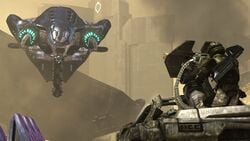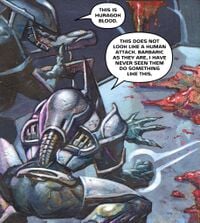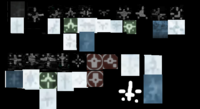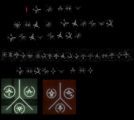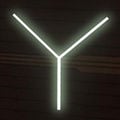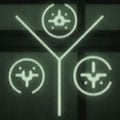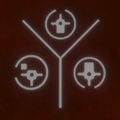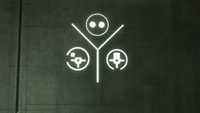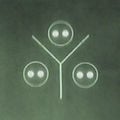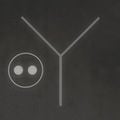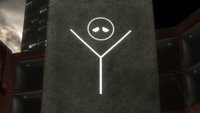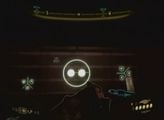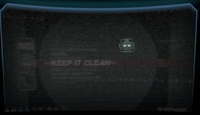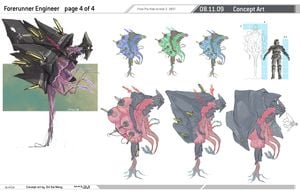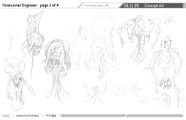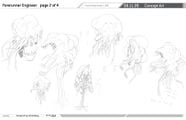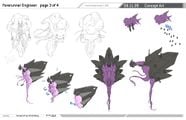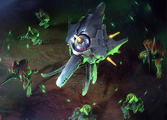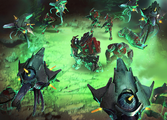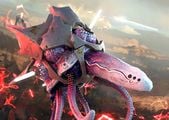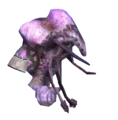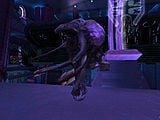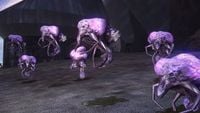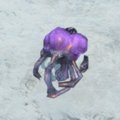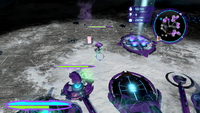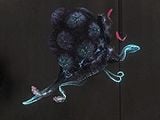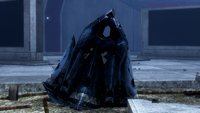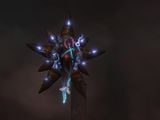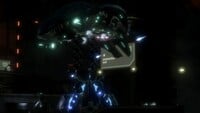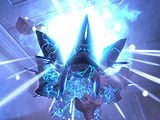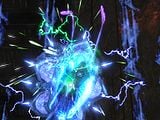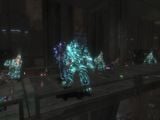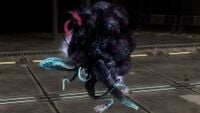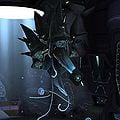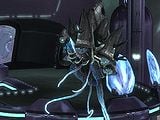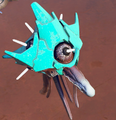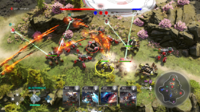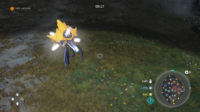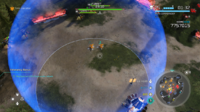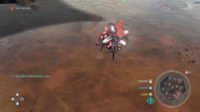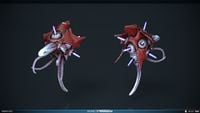Huragok
From Halopedia, the Halo wiki
| Huragok (Facticius indoles) | |
|---|---|
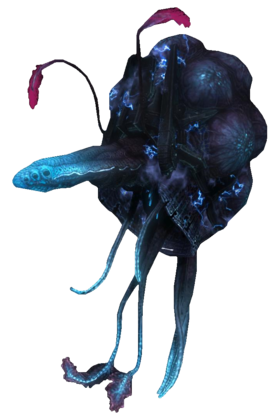
| |
| Physical information | |
|
Avg. height: |
180 centimetres (5 ft 11 in)–248 centimetres (8 ft 2 in)[1] |
|
Avg. weight: |
56.0 kilograms (123.5 lb)[2] |
|
Distinctions: |
Six appendages, bulbous sections, small snout, several eyes |
|
Avg. lifespan: |
10,000 years/possibly indefinite[3] |
| Sociocultural information | |
|
Notable individuals: |
|
|
Also known as: |
|
- "I don't exactly understand how the Huragok work—no surprise there—but they can fix just about anything you can break. They can also hook up to just about any kind of computer hardware in the galaxy. Forerunner, Covenant, and even human."
- — Edward Buck[13]
Huragok (Latin Facticius indoles[3] meaning "artificial genius"),[14] are a race of biomechanical sentient beings that were created by the Forerunners to maintain their technology[3] and, in some cases, biological beings. These remarkably helpful and docile pseudo-organisms are exceedingly patient, rarely communicate with other species, and are almost single-mindedly devoted to their work.[15] Huragok are known to exist in two varieties; those that used to serve the Builders, referred to by some individuals as Engineers,[10] and the rarer Lifeworker Huragok, who were designed to repair and maintain biological lifeforms.[16]
They were the only known non-combatant race of the Covenant aside from the San'Shyuum, though some were rigged to explode like suicide bombers during the Human-Covenant War.[17] This also served the purpose of asset denial, preventing their capture and redeployment by enemy factions. Following the Human-Covenant War, most Huragok mysteriously disappeared,[18] although some remained aligned with splinter factions of the original Covenant, including the Swords of Sanghelios and the Ussans, while a number ended up working with the United Nations Space Command. Similarly, there are many in service to the Banished, who not only continued the Covenant’s practice of fitting Huragok with explosive harnesses, but utilized crueler, more creative methods to modify their behavior.[19][20]
History
Origins
The Huragok were created by the Forerunners' Builders prior to the activation of the Halo Array with nanocellular technology to serve as maintenance, repair, and enhancement engineers.[3][21][22] They served as "servant-tools" to the Builders, the highest rate in Forerunner society. The Lifeworkers also employed a type of Huragok specializing in living things and medicine rather than machinery, though they were rarer than the Builder variety.[16][23] Huragok often served aboard semi-automated maintenance stations, including a number of facilities within the San'Shyuum home system. They were rarely accorded personhood in Forerunner society, and some found their anaerobic metabolism and gas bladders disgusting. For this reason, they were never allowed in public.[24]
Being mechanical structures rather than organic life forms, they survived the activation and some remained aboard various M-series facilities.[3] Several were left within one of the Forerunners' shield worlds, Shield World 006, and would remain there for the next 100,000 years.[6]
The Covenant
The Huragok were discovered by the San'Shyuum Reformists aboard the M-series facilities at a point prior to 938 BCE. The Huragok were employed as the San'Shyuum's science, maintenance and archaeological specialists.[1] They were used to retrieve and dissect Forerunner artifacts, as well as to repair spacecraft and machinery. The Huragok did not attempt to resist when the San'Shyuum "tamed" them.[22] Huragok operated aboard San'Shyuum vessels during the War of Beginnings.[25] When the Covenant was established in 852 BCE, the Huragok continued to fulfil the same role they had executed for the Reformists.[1]
Huragok were essentially the scientific and engineering backbone of the Covenant and its economy. They fulfilled one of the most important roles within the Covenant, as they bore the responsibility of maintaining the Covenant's machines, managing medical matters, and interacting with Forerunner technology. While it was generally held that only the San'Shyuum were high enough in the Covenant hierarchy to handle and manage Forerunner research and technology, in reality it was the Huragok who must excavate, unlock, and transport Forerunner artifacts—a fact only known to higher-ranked officials and leaders within the Covenant, due to its sensitive nature.[15] The Huragok were also tasked with securely transmitting data between locations.[1]
The Huragok in the Covenant usually communicated only with San'Shyuum, a fact that may have contributed to the balance of power between Sangheili and San'Shyuum, and usually ignored anything that was not a San'Shyuum, a Forerunner artifact, or a machine.[15][26] A notable exception is the Huragok Lighter Than Some, who communicated with the Unggoy Deacon Dadab via Huragok sign language.[27] Huragok participated in the Human-Covenant War throughout the conflict, though they were rarely witnessed by personnel of the United Nations Space Command until the final years of the war.[1] During various engagements in the Human-Covenant War, Huragok were deployed on certain human colonies to search for Forerunner technology. During the Battle of Mombasa, they scoured the city for evidence of the Portal that lay beneath its foundation.[28]
During the Great Schism, the now predominantly Jiralhanae-controlled Covenant military placed explosives charges onto the bodies of Huragok, in order to prevent them from falling into the hands of UNSC forces. The Huragok did not initially resist this measure, as they were made to believe that humanity would force them to defile Forerunner relics should they ever be captured.[29] Once they realized it was to make them suicide bombers, however, many Huragok made attempts to resist receiving charges, usually failing.[30][31] The Huragok were warned that if they disobeyed orders, their attached explosive charges would be detonated. However, some realized that the only chance they had to escape Jiralhanae brutality was to aid humanity in defeating the Covenant. As a result, the Huragok worked to allowoww a handful of their compatriots escape their commanders.[32]
Post-war
After the dissolution of the Covenant, most of the Huragok formerly in the hegemony's possession either died or dispersed, initially leaving the Sangheili at a loss without their mastery of technology.[33] However, a small number of Huragok remained at the hands of the Swords of Sanghelios as well as other Sangheili factions.[34]
Between November 2552 and March 2553, Lucy-B091 discovered four Huragok inside Shield World 006 in Onyx. These Huragok eventually helped the human survivors in the shield world reestablish contact with the UNSC.[35] By March 2553 Requires Adjustment and the three Huragok from the shield world were stationed aboard UNSC Infinity. In the time since arriving on Infinity they created several new Huragok to aid them. The Huragok aboard Infinity made various improvements to the ship, enhancing its slipspace capabilities to be faster and more accurate and reworked the communications system, enabling Infinity to maintain contact from slipspace.[18] Two Huragok were also assigned on Kilo-Five's prowler—UNSC Port Stanley—in order to provide it with the same upgrades as Infinity.[36]
Many Huragok are strategically employed by the UNSC's Office of Naval Intelligence, primarily to assist in the reverse-engineering of Covenant technology or deciphering Forerunner data terminals.[1] During the events surrounding the capture of the Covenant flagship Ascendant Justice and Operation: FIRST STRIKE in late 2552, the UNSC had captured a number of Huragok aboard UNSC Gettysburg and successfully brought them to Earth. These Huragok met various in the final weeks of the Covenant War; the survivors were assigned to work on Infinity, as well as top-priority Forerunner research sites such as ONI Research Facility Trevelyan.[5] Following the Shadow of Intent's encounter with Tem'Bhetek the CAS-class assault carrier was given a contingent of Huragok.[37]
Rear Admiral Saeed Shafiq of UNSC Procurement planned to have Huragok deployed on all UNSC ships by 2557.[38] Despite the obvious advantages, Admiral Margaret Parangosky was apprehensive about Shafiq's proposal due to the risk of the Huragok potentially falling into enemy hands.[39] Despite their assistance greatly benefiting humans by spurring technological development and the understanding of Forerunner relics, the Huragok are under perpetual scrutiny due to the UNSC's limited knowledge of them, including possible hardwired directives that could potentially be exploited by threats such as the Ur-Didact.[1] By October 2558 the UNSC Infinity had a contingent of 8 Huragok.[40]
Several Huragok were used by the Banished to repair and shield their vehicles during their occupation of Installation 00.[41] These Huragok in the service of the Banished existed in constant agony due to the control yokes bonded to their flesh forcing them to ignore endless requests for maintenance from the Ark as a result of Atriox's extraction and excavation efforts.[19] Extended exposure to Voridus' infusion gel altered his Huragok assistants, causing some to simply fall apart while the rest changed in other-more subtle-ways. These "damaged" Engineers were shunned by their healthy companions and displayed distinctly non-Huragok behaviors, such as a lack of interest in repairing Forerunner machinery and sabotaging equipment of Banished who have annoyed them in the past.[42]
Biology and description
Anatomy and physiology
The Huragok are not a natural, biological species at all, but rather an artificial life form created by the Forerunners. While they possess no true tissues or organs, their nanomechanical surrogates so closely mimic their biological analogs that they seem almost indistinguishable to observers.[3] Multiple translucent pink and purple gas-bladders on their backs that serve as their method of locomotion, allowing them to float through the air. The bladders contain lighter-than-air gases that must be maintained at a certain mixture. Normally, Huragok only float a few feet above the ground. However, they are capable of rising significantly higher for relatively short periods of time.[2][28] Each of the bladders are used for specific functions; some for propulsion, some for elevation, and others for chemical supply.[22] The bladders also serve as part of their respiratory system; if a Huragok's gas-bladders deflate, it will asphyxiate and die.[43] Physically, the Huragok closely resemble the Gigastaurozoa, though with a significant difference in locomotion.[3]
Huragok have small, elongated heads with six dark eye-like sensory nodes, and four tentacles that can split into very small, microscopically fine cilia. The Huragok use these cilia to construct, repair and manipulate machinery on a near-microscopic level.[22] Certain Forerunner installations feature panels, apparently similar to human touch-pad technology, that Huragok can "type" on using their cilia.[44] Some installations also feature hidden mechanisms that only the Huragok's refined cilia are capable of operating.[45] They can take apart whole vehicles and rearrange their entire structure in a matter of seconds, with the resulting machines still operating at least as well as they did before.[46] They learn at an unprecedented rate, and store that information for future reference if ever they need to repair the same thing twice. They are capable of surviving in at least oxygen and methane-rich environments, though they cannot survive in a vacuum.[47]
While Huragok have the ability to adapt to survive on any power source, they prefer a kind of sugary yeast nutrient paste. When this sludge-like food is not readily available, Huragok will gladly consume any sugary food. On one occasion, a Huragok even requested that a slice of birthday cake be puréed for it to consume. However, if the need arose, a Huragok could forgo food altogether and adapt to draw energy from a power outlet.[48][49]
As a result of their biomechanical nature, Huragok possess the ability to interface with electronic forms of data storage, "downloading" data directly into themselves. They appear to be able to "read" biological life-signs as well; during her time within Shield World 006, Lucy-B091 was analyzed by a Huragok, who scanned her brain activity in an attempt to determine the cause of her vocal disarticulation.[50] Huragok can also be trained to sense signals broadcasted on a specific frequency by Forerunner technology in need of repair.[51] Huragok are capable of self-repairing all but the most catastrophic physical damages inflicted upon them, as long as the individual has access to a sufficient amount of raw materials. Huragok can also repair each other if they have access to at least ten percent of the damaged individual's original mass.[2][3]
Huragok are bioluminescent, and in dark conditions their heads and tentacles emit a bright bluish glow, which pulsates when the Huragok is calm and brightens or dims according to its emotional state. The cilia on their tentacles give off a pinkish-red light as well. Huragok blood is luminescent blue-purple in color.[17]
Though the inner workings of an Huragok's internal macroscopic biology remain a mystery, it is known that they are capable of using the gas sacks that keep them afloat for anaerobic respiration. This method is painful, dangerous, and apparently only used as a last resort.[52] Despite their buoyant nature and graceful, fragile appearance, Huragok are quite strong. When nearby individuals tamper with or endanger Forerunner technology, they are capable of using moderate to extreme force to deter them; one Huragok threw Jul 'Mdama across a room when the latter was in danger of activating a malfunctioning slipspace portal.[53]
Lifeworker Huragok are a specialized type of Huragok specializing in medicine. They are outwardly distinct from the normal Builder Huragok by their smaller size,[54] green color and lack of bioluminescence.[55] They also have several more tentacles,[54] one of which is used for illumination.[56]
Reproduction and life cycle
Huragok reproduction is overtly more mechanical than it is biological, though there are still strong similarities to biological reproduction.[1] Huragok reproduce by gathering organic materials from their surroundings to "build" another Huragok. The new Huragok is built with the deft application of their tentacles' cilia.[4] This new offspring's air sacs are then filled with a mixture of lighter-than-air gases. This is the most difficult step in the reproduction process, as a precise mixture of gases is required in order for the "offspring" to be perfectly buoyant.[1] Each Huragok that takes part in this process relays all the information that they have learned to their offspring. Given sufficient raw materials, a pair of Huragok can produce a unified replica of themselves in approximately forty-five minutes; the addition of a third Huragok cuts the time down to thirty minutes.[3] A maximum of three Huragok can participate in the reproduction. Understandably, it is advantageous to have as many Huragok contribute to this process as possible, raising the "intelligence" of the offspring. Additionally, the Huragok offspring will grow to have a wider range of experience if a third parent was involved in the reproduction.[2]
Upon birth, a Huragok will either initially float or sink—depending on the mixtures of gases used to inflate their air sacs.[1][2][4] Huragok are extremely long-lived; the theoretical lifespan for an individual Huragok recorded by the Forerunners' own Bestiarum was stated to be 87,600,000 hours, or 10,000 years; however, based on evidence from other sources, the Bestiarum concluded that the limit would more accurately be described as effectively indefinite[3] if the Huragok is able to avoid serious injury or disease.[2]
Culture
- "They are almost without volition—too easily influenced. And difficult to communicate with."
- — The High Prophet of the Glorious Journey on the Huragok[57]
Huragok hardly have a culture of their own. Instead, they prefer to focus on the maintenance and technological roles that they are so often assigned. They have little interest in taking sides in conflict; they appear to draw no real distinction between friend and foe, preferring to spend their time inspecting or repairing technology, although they will react with agitation if Forerunner technology is damaged or compromised in any way.[2] They are apathetic to any sort of combat, and tend to just float along with a single goal: to fix things. In one encounter, during John-117's assault upon Ascendant Justice, one even aided the SPARTAN-II by repairing the shield generator on his MJOLNIR armor and fixing the Spartan's current weapon, a broken Needler. However, Elias Haverson killed the Huragok, stating that it had learned about the MJOLNIR shield technology, which was superior to the Sangheili personal energy shield, and could not be allowed to relay that information. Another Huragok protested, but then was distracted by a calling terminal and resumed work.[58] If shot at in a firefight, Huragok make no attempt to defend themselves, but rather curl up in fright and float to a safe distance.[17]
Huragok are noted to have no agenda but to accomplish repairs, maintenance, and orders. The species was known to be "eerily trustworthy".[22] Despite their generally pacifistic nature, they can be pushed into violence when a friend is in danger, as demonstrated when Lighter Than Some saved his friend, the Unggoy Dadab, by killing the human, Henry Gibson, with a hunting rock.[27] They also will react forcefully when Forerunner technology is threatened, demonstrating surprising strength as they attempt to keep others from causing harm to Forerunner devices or to themselves.
Their concentration has been described as "a trance-like reverie" by those who have witnessed it.[15] Huragok are also capable of quickly learning the functionality of new technology. On one occasion, a Huragok was observed by John-117 dismantling a vehicle's engine, assembling it into various other working configurations, and then returning it to its original state, all in a matter of seconds.[46] The abilities of the Huragok are not limited to their skills to fix things; they are also able to absorb data from a computer or an AI, and combine it with their own biological "data". One such incident occurred when one Huragok combined its knowledge with the "dumb" AI of New Mombasa, the Superintendent. During a mission to recover a living Huragok, Captain Veronica Dare described the species as "biological supercomputers".[59] However, the actual amount of information that Huragok can extract is limited, and would require a more advanced artificial intelligence to assist in truly understanding the work of a Forerunner construct.[3]
Huragok have also been known to display great compassion and caring for one another. During the Battle of Mombasa, Doctor Daniel Endesha observed six Huragok selflessly give their own lives while attempting to disarm a bomb attached to another, which detonated after its removal and killed all but the seventh Huragok.[31]
Role within the Covenant
During their enslavement to the Covenant, the Huragok were not normally a tactical threat and were rarely ever seen in combat situations. During their service with the empire, most Huragok desired little more than food and work.[22] Most UNSC soldiers made a point of avoiding intentionally harming Huragok if possible. Unlike the majority of the Covenant races, they did not regard humans as enemies. During the events surrounding the first contact between the Covenant and humanity, a Huragok named Lighter Than Some attempted to aid the humans in an attempt to bring peace; he even made them a peace offering, which, against his wishes, was appropriated by the Jiralhanae and converted into the Barukaza Workshop Chopper.[60] As Huragok were easily influenced and often difficult to communicate with, the species could not be admitted as a witness during a trial before the Hierarchs.[57]
Huragok were often assigned to work with certain Sangheili or Unggoy.[22][61] Huragok are an extremely valuable asset to a crew, as they enjoy fixing things immensely; they are often described as caring about nothing else.[62] They take great pride in their work, and also in their buoyancy, enjoying being confined by gravity and floating a meter or so off the ground.[24] However, they are also very peace-loving and have a great respect for life in general.[63] The Huragok Lighter Than Some even refused to play a game that would kill non-sentient pests.[64]
Huragok are often tasked with excavating, transporting, and documenting Forerunner artifacts, which are monitored by San'Shyuum.[2] When deployed during large-scale archaeological expeditions, the Huragok of the Covenant made use of large recharge stations, where they rest, repair each other, and share data between forays.[17]
Symbols
Huragok are known to mark some areas of significance with mysterious glyphs, which can be found on various surfaces, walls, ceilings, floors, even in transmissions,[65] often in irregular patterns. There are three known types of symbols:
- The "Y"-shaped ones often with glyphs similar to Forerunner symbols around them.
- The "O"-shaped ones sometimes with a symbol in them.
- Or simply in lines.
The symbols are likely related to the Huragok's Forerunner origin,[59] though it is known that they are a deviation to the Forerunner variants of the Huragok symbols.[66]
The symbols were also conveyed by the species through Huragok sign language.[67] Each symbol is believed to tell "stories", and some represent the shape of Forerunner starships.[68]
Known symbols and glyphs
Languages and communication
Huragok can communicate with other Covenant species, such as the Sangheili,[69] Kig-Yar,[70] or Unggoy—particularly the more intelligent ones such as the Deacon Dadab—and with other Huragok, by flexing their limbs in various directions, bending and overlapping to form the specific formation for each word, much like human sign language.[4] Through the sign language, the Huragok conveyed their own symbols. The Huragok could impart these symbols at a high speed, with some being represented by the tip of the tentacle becoming a corkscrew shape, the crossing of tentacles, or the tentacles becoming fashioned into a series of "O" and "V" shapes.[45] The Sangheili occasionally used translation software to holographically translate the symbols to the Sangheili language.[67] Huragok sign language was known to be quite difficult to learn without the translation software.[69] Their gas sacs can also swell and deflate at times of great emotion, suggesting another, more subtle method of communication.
Huragok can also communicate using melodic whistling sounds, as shown when Cortana used a Covenant SHIPCOM speakers to verbally communicate with a Huragok.[71] Their verbal communication is almost musical, and very slightly resembles the calls of Earth's whales. The Huragok were known to make certain sounds to express emotions, such as chirping noises to indicate joy[45] or a fluting whistle to convey sadness.[72]
Huragok can gain an understanding of other species' spoken languages.[73] In order to facilitate more efficient communication with other species, they are capable of typing messages on devices such as data pads and using voice synthesizers.[74] However, some individuals can understand Huragok, without a translator, based on their verbal communications.[70]
Naming conventions
- "All their names have something to do with their buoyancy qualities. Why they've never run out of words to describe that, I have no idea."
- — Sav Fel on Huragok names[8]
When Huragok are born, its parents must carefully balance the air sacs of their offspring with gases.[2] The gases initial buoyancy in newly born Huragok determines the name its parents bestow upon them;[1] for example, one that sinks might be named 'Far Too Heavy', one whose buoyancy is almost perfect might be named 'Easy to Adjust', and those whose gas mixture causes them to exhibit notable buoyancy might be named 'Lighter Than Some'.[4]
Gameplay
Halo 3: ODST
In Halo 3: ODST, Alpha-Nine will encounter Huragok during the campaign. It is recommended one focus on eliminating them first, as they provide enemies with energy shields. If one gets too close, the Huragok will commit suicide and the explosion can kill the player instantly, or alternately if the enemies surrounding the Huragok are eliminated, it will trigger self-destruction. When players obtain Vergil, if they stay close to it they will get an energy shield. The time to recharge is rather slow compared to a Spartan's MJOLNIR gear. However, it immediately gives players a full shield once recharged. Note that going too far from Vergil will cause your energy shield to disappear. If the player's stamina is almost depleted, the player can regain the stamina back instantly once the player receives energy shielding from Vergil.
Halo: Reach
Although they appear in fewer missions, Huragok should also be a top priority to get eliminated. Huragok can give their allies extra shields, and allows enemy Elites to regenerate their original energy shields.
Halo Wars
In Halo Wars, Huragok provide the only means for the Covenant to repair damaged buildings, vehicles and heal injured units. They are easily slain as they are unarmed and can only be repaired by other Huragok—not by themselves. They do not attack and automatically search for damaged machinery, buildings and troops to heal and repair. Huragok create an almost unstoppable force when combined with the Scarab.
- Resources: 250 (requires Summit)
- Minimum Tech Level: 0
- Population Count: 1
- Upgrades:
- State of Grace: Increases rate of healing and repair. Requires 350 resources and a tech level of 1.
- Harmonious Digestion: Increases movement speed. Requires 700 resources and a tech level of 2.
Halo Wars 2
Engineer
- Info: Support Unit, Repairs and heals, Non-combative, Detects cloaked units, can provide temporary energy shield that reduces damage to units inside. (can be stacked, although effectiveness decreases each time)
- Tier: 1
- Cost: Population 3, Supplies 120, Power 50
Huragok can be built by all Banished leaders besides Voridus at the Banished Apex. In addition to healing friendly units, Huragok are able to cast an overshield as their main ability. Huragok cost 60 energy in Blitz. Because their healing and repair ability is limited to one target at a time, their healing rate is three times faster than the UNSC's Nightingale, which can heal three units at a time. Two Engineers alone are enough to heal the Conduit quickly to full condition.
Infused Engineer
- Info: Support Unit, Repairs and heals, Throws pools of infused gel, Detects cloaked units
- Tier: 1
- Cost: Population 3, Supplies 220, Power 40
Infused Huragok are exclusive to the leader Voridus and can be built at the Apex. Unlike their standard counterparts Infused Engineers cannot cast overshields, but instead deploy pools of infusion to buff allies or damage enemies. In Blitz Infused Huragok cost 50 energy.
Terminus Engineer
- Info: Explode above one of the base structure and call glassing beam upon explosion.
Terminus Engineers are Huragok modified with a glassing beam targeting marker. If one commits suicide over a base, a glassing beam will strike and damage the player's base. Terminus Engineers only appear in certain waves in Terminus Firefight. If player succeeds destroying it, it will not call a glassing beam, but if commits suicide, it will call a glassing beam. The Terminus Engineer is the one of the only units that can attack the player's main base.
Production notes
- "A sentient labor-saving device with the ability to self-repair and self-replicate. Good with computers."
- — Bungie.net description of Huragok
The creation of the Huragok started around 1999, during the development of Halo: Combat Evolved. From the beginning, they were meant to be "a class of aliens that acted as idiot savants towards technology," and were meant to be able to decipher Forerunner technology easily and allow a glimpse into what made the Forerunner technology so special. As far as gameplay, the designers wanted a race that were less aggressive to populate the world in a more passive way, making Halo feel more alive. The general idea of the Huragok was to be "a character meant to be passive, almost puppy like in nature," and make the players feel bad if they killed them.[75]
In the early development of Combat Evolved, more insectoid explorations were done into the Engineers' form, before going in the direction seen in canon. These early explorations were later revisited in Halo 2 with the introduction of the Yanme'e. These early concepts' name of the "Drone Engineer" became the namesake of the Yanme'e (Drones) and Huragok (Engineers), respectively.[76]
Sea creatures were used for inspiration, especially underwater sea slugs and glowing jellyfish; their movements, the way they emit light, the fluidity of their bodies—and tried to translate that into a creature out of water. According to Shi Kai Wang, underwater sea creatures like the jellyfish had the right type of feel to them, a very docile and graceful creature that just minds its own business—very much how they initially wanted the Huragok to be. More emotive states were added to their animations and facial features to make them relatable, so that people would feel for them. The Huragok were eventually cut from Halo: Combat Evolved, as there was not enough time or technology to "make them feel right".[75]
For Halo 3: ODST, the Huragok were completely redesigned to fit the gameplay, and to make them more in-depth characters. As the graphics, technology and capabilities were now available, the creatures could be made just like they were originally envisioned. Originally, in Halo 3: ODST, the Engineer was to suck its limbs and head into a cocoon shell and have it float away in distress or cower in fear. This effect was not fully achieved as a good solution for how the animations would work alongside gameplay could not be figured out. Eventually, the idea was turned into something similar but a scaled-down version.[75]
In Halo: Reach, Engineers were made slightly less sympathetic and more alien.[77] They have lost their pink feathery feelers, and do not react to being shot at by the player. Additionally, rather than exploding and turning its own body into a suicide weapon like in ODST, their death will simply result in their body bursting apart, which causes no surrounding damage.
Trivia
| Language | Equivalent |
|---|---|
French |
Les Ingénieurs in all media. |

|
Browse more images in this article's gallery page. |
- Engineers are the only Covenant race to be cut from the Halo trilogy and appear in later games.
- In Halo 3: ODST, the "Good Samaritan" achievement can be unlocked by not killing any Engineers in New Mombasa at night during the entire campaign, alone or with another ODST. On the other hand, killing ten of the Engineers in the city will unlock the "Naughty Naughty" achievement.
- In Halo: Reach, a well-placed headshot will detach the face mask without killing the Huragok.
- In Halo: Reach, on the side of the Huragok's armored shell, there is a v-shaped symbol that bears a striking resemblance to the NOBLE Team logo.
- Their naming conventions were likely inspired by the classic game Star Control II, which features a race of "gasbag" aliens called the Slylandro, who have names like "Content to Hover," "Sullen Plummet," and "Joyous Lifting".
Gallery
Concept art and illustrations
Concept art of a Huragok for Halo 3: ODST.
Two Huragok as seen in Halo Legends' Origins.
Renders and screenshots
A side view of the cut Huragok from Halo: Combat Evolved.
The early look of a Huragok aboard a Covenant ship.
A group of the concept Engineers from a Halo: Combat Evolved mod of the level "The Silent Cartographer".
Huragok as seen in Halo Wars.
A Huragok repairing a turret on Harvest.
A Phantom dropping off/picking up Huragok into one of their recharging stations.
The exotic lighting and colors of a Huragok when its shields are disrupted by an EMP charge from a Plasma Pistol.
A view of a Huragok aboard Ardent Prayer.
A Banished Engineer in the Halo Wars 2 Open Beta.
Banished Huragok healing Gydrozka Workshop Blisterbacks in the Halo Wars 2 - Blitz Beta.
A Banished Huragok in Halo Wars 2.
Render of a Huragok sporting Banished colours.
List of appearances
|
|
Sources
- ^ a b c d e f g h i j k Halo Waypoint: Huragok
- ^ a b c d e f g h i Halo Encyclopedia (2009 edition), page 122; pages 128-129 (2011 edition)
- ^ a b c d e f g h i j k Halo 3, Bestiarum
- ^ a b c d e Halo: Contact Harvest, page 54
- ^ a b Halo Waypoint: Canon Fodder - Feet First
- ^ a b Halo: Glasslands, page 191
- ^ Halo: Glasslands, page 252
- ^ a b Halo: Mortal Dictata, page 113
- ^ Halo: Last Light, Chapter 3, page 36 (Google Play edition)
- ^ a b Halo: Ghosts of Onyx, page 237 ("Huragok: the Forerunner name for the Engineer race.")
- ^ a b c Halo 2, Conversations from the Universe
- ^ Halo: New Blood, page 14 (Google Play edition)
- ^ Halo: New Blood, page ???
- ^ halo.bungie.org: Bestiarum Latin names translated
- ^ a b c d Bungie.net: The Covenant Primer
- ^ a b Halo: Last Light, Chapter 9, page 130 (Google Play edition)
- ^ a b c d Halo 3: ODST
- ^ a b Halo: The Thursday War, page 50
- ^ a b Halo Wars 2, Phoenix Logs - "Engineers"
- ^ Cite error: Invalid
<ref>tag; no text was provided for refs namedPLEI - ^ Halo Waypoint, Cryptum Glossary (Retrieved on Mar 14, 2014) [local archive] [external archive]
- ^ a b c d e f g Halo: Broken Circle, pages 78-79 (Google Play edition)
- ^ Halo: Hunters in the Dark
- ^ a b Halo: Cryptum, page 144
- ^ Halo: Broken Circle, page 92
- ^ Halo: The Fall of Reach, pages 200-201
- ^ a b Halo: Contact Harvest, page ??
- ^ a b Halo 3: ODST, Epilogue
- ^ Halo: The Thursday War, page 202
- ^ Halo 3: ODST campaign level, Mombasa Streets (Brute Captain: "Arrgh! Hold the creature still!" Brute Minor: "Place the charge, before I lose my grip!")
- ^ a b Sadie's Story: Audio log 18, Circle 6, Arc 3
- ^ Halo: New Blood, pages 73-74 (Google Play edition)
- ^ Halo: Glasslands, page 54
- ^ Halo: Hunters in the Dark, page 47 (Google Play edition)
- ^ Halo: Glasslands, page 140
- ^ Halo: The Thursday War, page 250
- ^ Halo: Warfleet, pgs. 70-71
- ^ Halo: The Thursday War, page 94
- ^ Halo: The Thursday War, page 234
- ^ Halo: Warfleet, pages 42-43
- ^ Halo Wars 2
- ^ Halo Wars 2, Phoenix Logs - "Infused Engineer"
- ^ Halo: Contact Harvest, page 188
- ^ Halo: Glasslands, page 193
- ^ a b c Halo: Broken Circle, pages 108-114 (Google Play edition)
- ^ a b Halo: The Fall of Reach, page 183
- ^ Halo: First Strike, page 68
- ^ Halo: The Thursday War, Chapter 15
- ^ Halo: Mortal Dictata, Chapter 2
- ^ Halo: Glasslands, page 329
- ^ Halo: Broken Circle, pages 112-113
- ^ Halo: Contact Harvest, page ??
- ^ Halo: The Thursday War, page ??
- ^ a b Halo: Last Light, Chapter 10, page 122 (Google Play edition)
- ^ Halo: Last Light, Chapter 10, pages 118, 120 (Google Play edition)
- ^ Halo: Last Light, Chapter 9, page 111 (Google Play edition)
- ^ a b Halo: Broken Circle, page 161 (Google Play edition)
- ^ Halo: First Strike, pages 105-121 (2010 edition)
- ^ a b Halo 3: ODST, campaign level Data Hive
- ^ Halo: Contact Harvest, page 314
- ^ Halo: Broken Circle, pages 263-264 (Google Play edition)
- ^ Halo: First Strike, page 96
- ^ Halo: Contact Harvest page ??
- ^ Halo: Contact Harvest, page 91
- ^ Sadie's Story: Audio log 23, Circle 8, Arc 2
- ^ Halo Waypoint: Catalog Interaction (post 3003659)
- ^ a b Halo: Broken Circle, page 100 (Google Play edition)
- ^ halo.bungie.org: Joe Staten comment in oxm *spoilers*
- ^ a b Halo: Broken Circle, page 84 (Google Play edition)
- ^ a b Halo: Mortal Dictata, page 126
- ^ Halo: First Strike, page 88
- ^ Halo: Broken Circle, page 118 (Google Play edition)
- ^ Halo: The Thursday War, page 49
- ^ Halo: Glasslands, page 309
- ^ a b c Bungie.net: Engineer Evolved
- ^ The Art of Halo: Creating a Virtual World, page 46
- ^ Bungie.net: Bungie Weekly Update 08/20/10: "But don’t worry, we’re not going to make you feel like a monster for taking them down this time out..."
| |||||||||||||||||||||||||
| ||||||||
